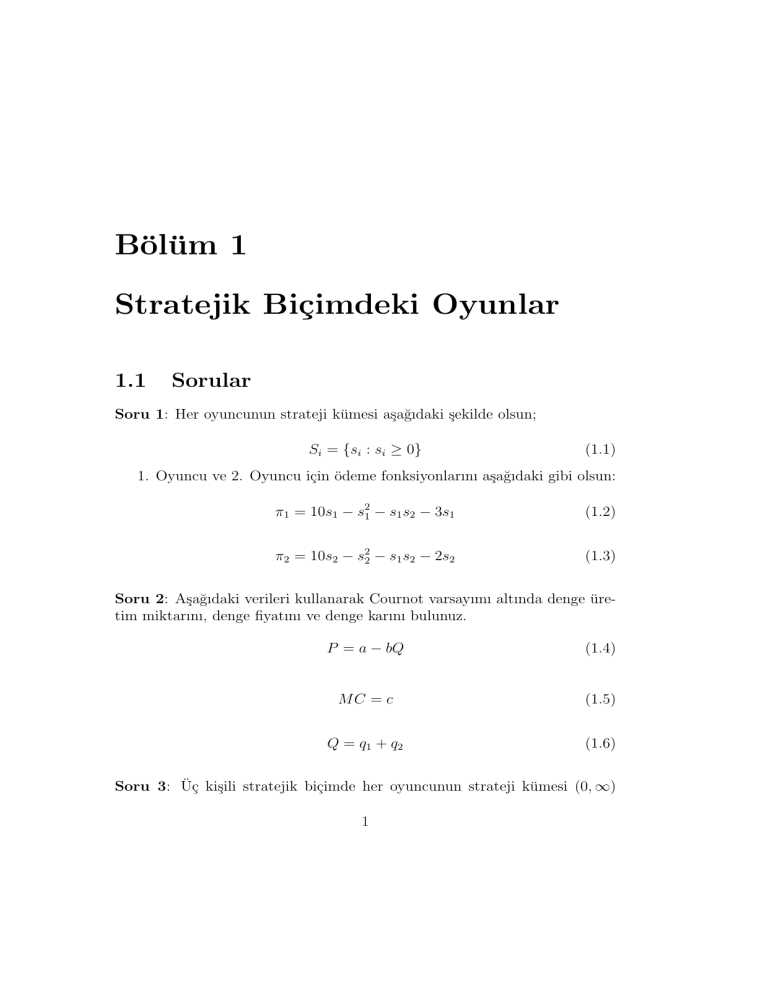
Bölüm 1
Stratejik Biçimdeki Oyunlar
1.1
Sorular
Soru 1: Her oyuncunun strateji kümesi aşağıdaki şekilde olsun;
Si = {si : si ≥ 0}
(1.1)
1. Oyuncu ve 2. Oyuncu için ödeme fonksiyonlarını aşağıdaki gibi olsun:
π1 = 10s1 − s21 − s1 s2 − 3s1
(1.2)
π2 = 10s2 − s22 − s1 s2 − 2s2
(1.3)
Soru 2: Aşağıdaki verileri kullanarak Cournot varsayımı altında denge üretim miktarını, denge fiyatını ve denge karını bulunuz.
P = a − bQ
(1.4)
MC = c
(1.5)
Q = q1 + q2
(1.6)
Soru 3: Üç kişili stratejik biçimde her oyuncunun strateji kümesi (0, ∞)
1
2
BÖLÜM 1. STRATEJIK BIÇIMDEKI OYUNLAR
açık aralığa eşit olan bir oyun düşünelim. Oyuncuların ödeme fonksiyonları
aşağıdaki gibi olsun.
u1 (x, y, z) = 2xz − x2 y
p
u2 (x, y, z) =
12(x + y + z) − y
u3 (x, y, z) = 2z − xyz 2
(1.7)
(1.8)
(1.9)
Oyunun Nash dengesini bulunuz. (x,y,z = ?)
Soru 4: The Cournot Game
Players: Firms Apex and Brydox .
The Order of Play Apex and Brydox simultaneously choose quantities.
qa , q b
(1.10)
from the set [0, ∞).
Payoffs: Marginal cost is constant at
c = 12.
(1.11)
Demand is a function of the total quantity sold,
Q = qa + qb ,
(1.12)
and we will assume it to be linear ,and, in fact, will use the following specific
function:
p(Q) = 120 − qa − qb
(1.13)
qa , qb =?
(1.14)
Soru 5: The Bertrand Game
Players: Firms Apex and Brydox .
The Order of Play: Apex and Brydox simultaneously choose prices.
pa , pb
(1.15)
from the set [0, ∞).
Payoffs: Marginal cost is constant at
c = 12.
(1.16)
Demand is a function of the total quantity sold,
Q(p) = 120 − p.
(1.17)
pa , pb =?
(1.18)
1.2. CEVAPLAR
1.2
3
Cevaplar
Cevap 1: Oyun sürekli strateji kümesi ile oynandığından kesikli ödeme matrisini oluşturmak olanaklı değildir. Bunun yerine en iyi cevap fonksiyonları
kullanarak Nash dengesi elde edilmektedir. Birinci dereceden koşullar aşağıdaki gibi olacaktır,
∂π1
= 10 − 2s1 − s2 − 3 = 0
∂s1
(1.19)
∂π2
= 10 − 2s2 − s1 − 2 = 0
∂s2
(1.20)
s1 ve s2 için eşitliklerden değerleri çekersek aşağıdaki en iyi cevap fonksiyonlarına ulaşılacaktır:
s1 =
7 − s2
2
(1.21)
8 − s1
(1.22)
2
Buradan, eşitlik (1.6) ve (1.7) eş-anlı olarak çözüldüğünde s∗1 = 2 ve s∗2 = 3
bulunacaktır.
s2 =
Cevap 2:
π1 = P q1 − cq1
(1.23)
π2 = P q2 − cq2
(1.24)
∂π1
= a − 2bq1 − bq2 − c = 0
∂q1
(1.25)
∂π2
= a − bq1 − 2bq2 − c = 0
∂q2
(1.26)
q1 ve q2 için eşitliklerden değerleri çekersek aşağıdaki en iyi cevap fonksiyonlarına ulaşılacaktır:
q1 =
a − bq2 − c
2b
(1.27)
4
BÖLÜM 1. STRATEJIK BIÇIMDEKI OYUNLAR
a − bq1 − c
2b
Buradan, eşitlik (1.15) ve (1.16) eş-anlı olarak çözüldüğünde
q2 =
a−c
3b
a−c
q2 =
3b
q1 =
(1.28)
(1.29)
(1.30)
a − 2c
(1.31)
3
bulunacaktır. Bulunan bu değerler kar fonksiyonunda yerine konulursa denge
karına ulaşılmış olur.
P =
Cevap 3: Oyunun Nash dengesini bulmak için, aşağıdaki eşitlik sistemi
çözülmelidir,
∂u1
∂u2
∂u3
= 0,
= 0 ve
=0
∂x
∂y
∂z
(1.32)
Yukarıdaki türevler alındığında aşağıdaki birinci-dereceden koşullar bulunacaktır;
∂u1
∂u2
= 2z − 2xy,
=
∂x
∂y
r
3
∂u3
− 1 ve
= 2 − 2xyz
x+y+z
∂z
(1.33)
Birinci-dereceden koşullardan aşağıdaki eşitlik sistemi yazılabilir;
z = xy
x+y+z = 3
xyz = 1
(1.34)
(1.35)
(1.36)
Eşitlikler sisteminin tek çözümü x = y = z = 1 olacaktır.
Cevap 4:
π( Apex) = (120 − qa − qb )qa − cqa = (120 − c)qa − q2a − qa qb
(1.37)
1.2. CEVAPLAR
5
π( Brydox) = (120 − qa − qb )qb − cqb = (120 − c)qb − qa qb − q2b
qa = qb = 40 − c/3 = 36.
(1.38)
(1.39)
We can find the equilibrium price is 48.
Cevap 5: The payoff function for Apex (Brydox’s would be analogous) is
(120 − pa ) + (pa − c), pa < pb ;
(120−pa )+(pa −c)
πa =
,
p a = pb ;
2
0,
p a > ab .
The Bertrand Game has a unique Nash equilibrium:
pa = pb = c = 12.
(1.40)
That this is a weak Nash equilibrium is clear: if either firm deviates to a
higher price, it loses all its customers and so fails to increase its profits to
above zero. (In fact, this is an example of a Nash equilibrium in weakly
dominated strategies.) That it is unique is less clear.
